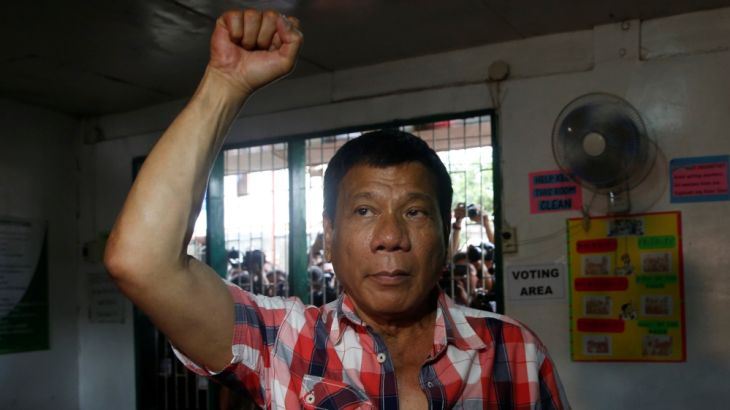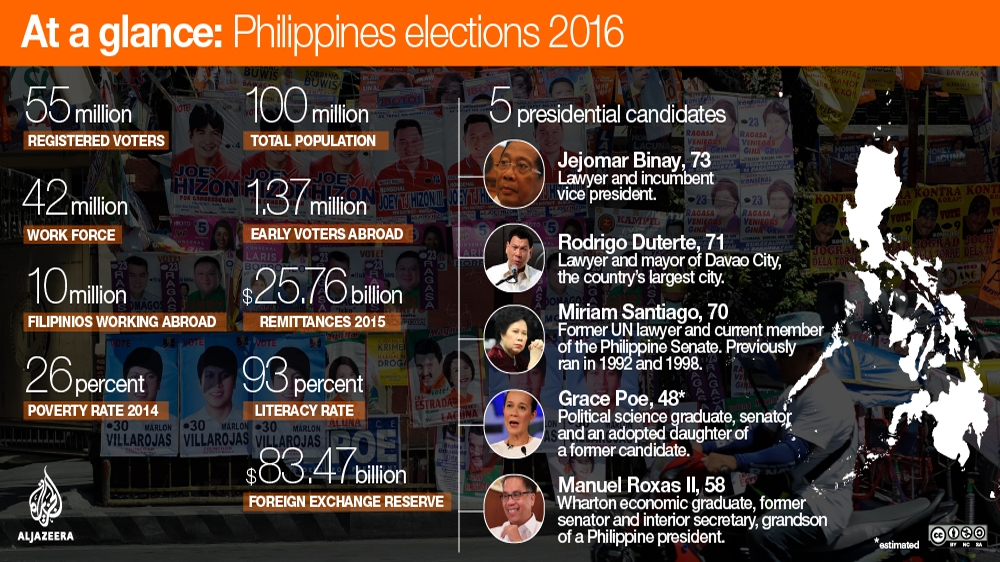Philippines election: Rodrigo Duterte claims victory
Unofficial results show populist mayor Rodrigo Duterte headed for big win in presidential poll.

Populist mayor Rodrigo Duterte has claimed victory in the Philippine presidential elections, following the withdrawal of his opponents.
Nicknamed “the punisher”, 71-year-old Duterte has promised a relentless crackdown on crime and the overhaul of the country’s constitution.
Keep reading
list of 4 itemsSummer Lee’s primary race tests fallout for critics of the US’s Gaza policy
Maldives votes in parliamentary elections amid India-China rivalry
Will India’s election be free and fair?
The Parish Pastoral Council for Responsible Voting (PPCRV) said that with 90 percent of the presidential ballots counted, Duterte had about 39 percent of the votes.
The PPCRV is a Catholic Church-run monitor accredited by the government.
Duterte’s main rivals – the ruling party candidate Mar Roxas and Senator Grace Poe – both conceded defeat after polls showed the mayor heading for a resounding victory.
Duterte said he accepted the mandate with “extreme humility”.
READ MORE: Why the Philippine ‘Punisher’ could be president
Al Jazeera’s Marga Ortigas, reporting from Manila, said many Filipinos had grown frustrated during six years under President Benigno Aquino.
“They were years of broad economic growth but that prosperity didn’t trickle down fast enough. Aquino and his administration were criticised as too elite, too impersonal, and out of touch,” she said.
Tapping into that sentiment, Duterte, mayor of the southern city of Davao, emerged as the frontrunner by brazenly defying political tradition, drawing comparisons to Republican presidential candidate Donald Trump in the US.
“He made some astonishing claims that in the first three to six months of office he is going to solve major problems, like crime and corruption,” Richard Heydarian of De La Salle University told Al Jazeera.
“Of course no experts will agree with him.”
The mayor’s single-issue campaign focusing on law and order chimed with popular anxiety about corruption, crime and drug abuse, but for many his incendiary rhetoric and talk of extrajudicial killings echo the country’s authoritarian past.
“He orders his police to basically go out and shoot criminals,” Ortigas said. “He also says corrupt politicians can face being shot by policemen.
“So, there is this fear that he can turn into a mini dictator.”
![Duterte has said he wants to catch robbers and kill them [Erik De Castro/Reuters]](/wp-content/uploads/2016/05/a25fe971e1644c60a7c619ee03ab467f_18.jpeg)
Many Filipinos are concerned that Duterte’s style of governance can carry the country back to the days of Ferdinand Marcos’s dictatorship that ended with an uprising 30 years ago.
On the other hand, Al Jazeera’s Wayne Hay, reporting from Duterte’s homebase, Davao, said his supporters see him as an authentic man of action.
“He is very popular here. One of the reasons he is so popular is his crackdown on crime,” he said. “This used to be regarded as one of the most dangerous cities in Philippines, but now it’s regarded perhaps as one of the safest.
“His supporters, people who are voting for him, believe he should take a lot of credit for that.”

Some members of Marcos’ family also had success in Monday’s election.
The late dictator’s daughter Maria Imelda Josefa Romualdez Marcos, who is known as “Imee”, has won the seat of governor in her home province. And his 86 year-old widow Imelda has run successfully for a seat in Congress for the third time.
Marcos’ son, Ferdinand “Bongbong” Marcos Jr, who was tipped to become the vice president, is currently trailing behind his rival, Leni Robredo.
While authorities described the overall conduct of the elections as peaceful, police said at least 10 people died across the country in election-day violence as gunmen attacked polling stations, ambushed vehicles and stole vote-counting machines.
The Armed Forces of the Philippines National Election Monitoring Center said in a statement that they monitored 22 election-related violent incidents.
OPINION: The Philippines’ autocratic nostalgia
In the worst attack, seven people were shot dead in an ambush before dawn in Rosario, a town just outside Manila known for political violence, Chief Inspector Jonathan del Rosario, spokesman for a national police election monitoring task force, told the AFP news agency.
Another 15 people were killed in election-related violence in the run-up to the polls.
There were several reports of electronic voting machine hitches, and voting was extended in several districts after delays in the opening of polling centres.
More than half of the population of 100 million people were registered to vote in the election to choose a president, vice president, 300 politicians and about 18,000 local government officials.
|
|